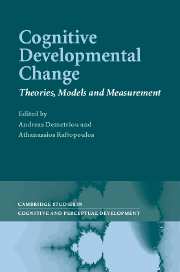Book contents
- Frontmatter
- Contents
- List of contributors
- Preface and acknowledgements
- Introduction: the what, how and why of developmental change: the emergence of a new paradigm
- 1 Mind, intelligence and development: a cognitive, differential and developmental theory of intelligence
- 2 Types of cognitive change: a dynamical, connectionist account
- 3 Developmental patterns in proportional reasoning
- 4 Building general knowledge and skill: cognition and microdevelopment in science learning
- 5 Cognitive change as strategy change
- 6 The emergence of mind in the emotional brain
- 7 Practices of quantification from a socio-cultural perspective
- 8 Contributions of central conceptual structure theory to education
- 9 Accelerating the development of general cognitive processing
- 10 Dealing with change: manifestations, measurements and methods
- 11 Dynamic modelling of cognitive development: time, situatedness and variability
- 12 Modelling individual differences in change through latent variable growth and mixture growth modelling: basic principles and empirical examples
- Index
- References
7 - Practices of quantification from a socio-cultural perspective
Published online by Cambridge University Press: 22 September 2009
- Frontmatter
- Contents
- List of contributors
- Preface and acknowledgements
- Introduction: the what, how and why of developmental change: the emergence of a new paradigm
- 1 Mind, intelligence and development: a cognitive, differential and developmental theory of intelligence
- 2 Types of cognitive change: a dynamical, connectionist account
- 3 Developmental patterns in proportional reasoning
- 4 Building general knowledge and skill: cognition and microdevelopment in science learning
- 5 Cognitive change as strategy change
- 6 The emergence of mind in the emotional brain
- 7 Practices of quantification from a socio-cultural perspective
- 8 Contributions of central conceptual structure theory to education
- 9 Accelerating the development of general cognitive processing
- 10 Dealing with change: manifestations, measurements and methods
- 11 Dynamic modelling of cognitive development: time, situatedness and variability
- 12 Modelling individual differences in change through latent variable growth and mixture growth modelling: basic principles and empirical examples
- Index
- References
Summary
Children are engaged with mathematics in their everyday activities. Look around you – notice the children chanting numbers as they jump rope or haggling over their scores in handball. Children in urban centres in Brazil buy and sell goods (Carraher, Carraher and Schliemann 1985; Saxe 1991); toddlers in working and middle-class homes in the US play number games and sing number songs with their mothers (Saxe, Guberman and Gearhart 1987); inner-city teenage boys keep track of their statistics in league basketball play (Nasir 2002). Mathematics is interwoven in children's everyday collective activities, and yet the cognitive-developmental study of children's mathematics has often overlooked such activities as sites for analysis. The result is that treatments of development often do not capture adequately the role of children's participation in collective activities, nor the way that children themselves contribute to the mathematical norms, values and conventions that take form in collective life.
The purpose of the chapter is to present a conceptual framework for analysing the interplay between individual and collective activity in cognitive development, using mathematical cognition as an illustrative case. The framework is rooted in an assumption common to psychogenetic treatments, whether structural-developmental (Piaget 1970) or activity-theoretic (e.g. Leontiev 1981): new cognitive developments emerge as individuals create and accomplish goals in daily activities. In this chapter I present an exposition of the framework with particular attention to the ‘what?’, ‘how?’ and ‘why?’ of development.
Throughout the chapter, I limit my discussion of cognitive development to practices of quantification.
- Type
- Chapter
- Information
- Cognitive Developmental ChangeTheories, Models and Measurement, pp. 241 - 263Publisher: Cambridge University PressPrint publication year: 2005
References
- 6
- Cited by

